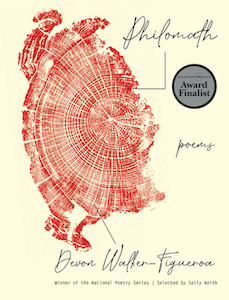 print preview
print previewback KATY SCARLETT
Review | Philomath by Katy Scarlett
Milkweed Editions, 2021
 |
Devon Walker-Figueroa opens Philomath, her first collection of poems, in the eponymous Philomath, a town in rural Oregon, close to where Walker-Figueroa grew up, where teenagers find creative ways of entertaining themselves (“They break / into gutted sanctuaries / of timber mills . . . ”) and residents can buy feed and new tire chains, cigarettes and pocketknives. In this introductory poem, we quickly learn that Philomath, a town whose name means “love of learning,” is not only a difficult place to leave, but is, in fact, a place which can never entirely be left behind. We catch a glimpse of what still haunts the poet in the image of a childhood friend, Megan, who the speaker wants to save from her abusive home life and her probable future: “Megan is still / in the bathroom stall, learning what it means / to be in Philomath for good.”
What follows is the speaker’s journey away from her small-town upbringing, as she learns about the wider world and reconciles with the different perspectives of past, present, and future. In the book’s first section, we learn particularly about community and the common experiences that tie together the people of Philomath. In “Golden,” the poet begins: “We are a kind / of sick that takes saving / up for.” In short lines that make the poem resemble a column, the speaker recalls her homelife, rendering vignettes of her sister, mother, and father, woven together with biblical mythology. The poem ultimately becomes a wish for the future, which reflects upon the speaker’s growing self-awareness and desire to escape:
There are times
I whisper to our empty living
room, move toward
the light. Find a way
out of this valley named
for a family so dead
everyone calls them Kings.
“King’s Valley,” (“a place known for its dead / settlers & Xmas trees”) is written in a meandering line structure, a collage of different memories, as the speaker attempts to understand herself in the context of her surroundings. These poems that layer together various scenes into one timeline, fused by lyric and line, give us a sense not only of the poet’s early writerly vigilance, but also of the complicated and sometimes punishing experience of being a girl in a small town in rural Oregon.
Throughout the book, the themes of puberty and womanhood persistently intermingle with reflections of religion and class. The “Blood’s Unwritable Psalm” reminds us of the speaker’s restless and growing spirit, which contends with forces beyond anyone’s control. The title here is borrowed from a line in Larry Levis’s “Poem Ending with a Hotel on Fire,” and Walker-Figueroa’s poem when read against his joins the two of them in a conversation about the circumstances of poverty, which Levis posits as so highly visceral, that it in fact borders on the divine.
Levis tells us:
The mother appearing in the dark of someone within whose
Sprawled arms clear gin and black tar mingle
To compose the blood’s unwriteable psalm.The blackening church bells say the poor are wrong
So does the traffic stalling on the bridge; so does the lazy swirl
Of current underneath it all, a smile fading in the dark.
To which, Walker-Figueroa answers:
If I’d been born in the shape of
a boy, I might have been
named after trees so oldthey are only the sounds we make for them.
Walker-Figueroa highlights the tenacity of the cultural value placed on masculinity, of the difference in treatment between girls and boys, and of that re-occurring weightiness we feel throughout the collection—a weightiness with which we can assume “the mother” in Levis’s poem has grappled over and over. The conversation here, centered on the correlations between suffering and divinity, is interrupted by Walker-Figueroa’s suggestion that we do have more control over shaping collective narratives than we want to admit.
The collection’s last poem, “Gallowed Be,” showcases not only Walker-Figueroa’s smart use of sonics but also the poet’s ultimate desire (or burning, a motif that appears throughout the book) to live with both truth and acceptance, simultaneously:
My sister braids my waist-
length mane, says, “This
place is lame.” I try to tell her
no one is to blame, but the sky is
so hollow it swallows every name.
In the end, we feel a kind of satisfying maturation, which is not a resolution, so much as an unsentimental reflection of reality, almost as if to say, in an intimate moment between two sisters, “We did the best we could.”
Walker-Figueroa’s debut collection is not an indictment of the place where she grew up but rather a careful consideration of origin, one which neither shields the reader from its flaws, nor exploits the suffering of the poet’s “ghosts.” There is value in the education the speaker has received from her child and teenage-hood, and one gets the sense that the speaker’s unending search for knowledge is much more than a survival tactic for this poet. Instead, it is a self-invented, sustainable way of understanding and experiencing the world around her. Philomath serves as an ultimate documentation of this crafted approach to living. ![]()
Contributor’s notes: Katy Scarlett
Contributor’s notes: Devon Walker-Figueroa